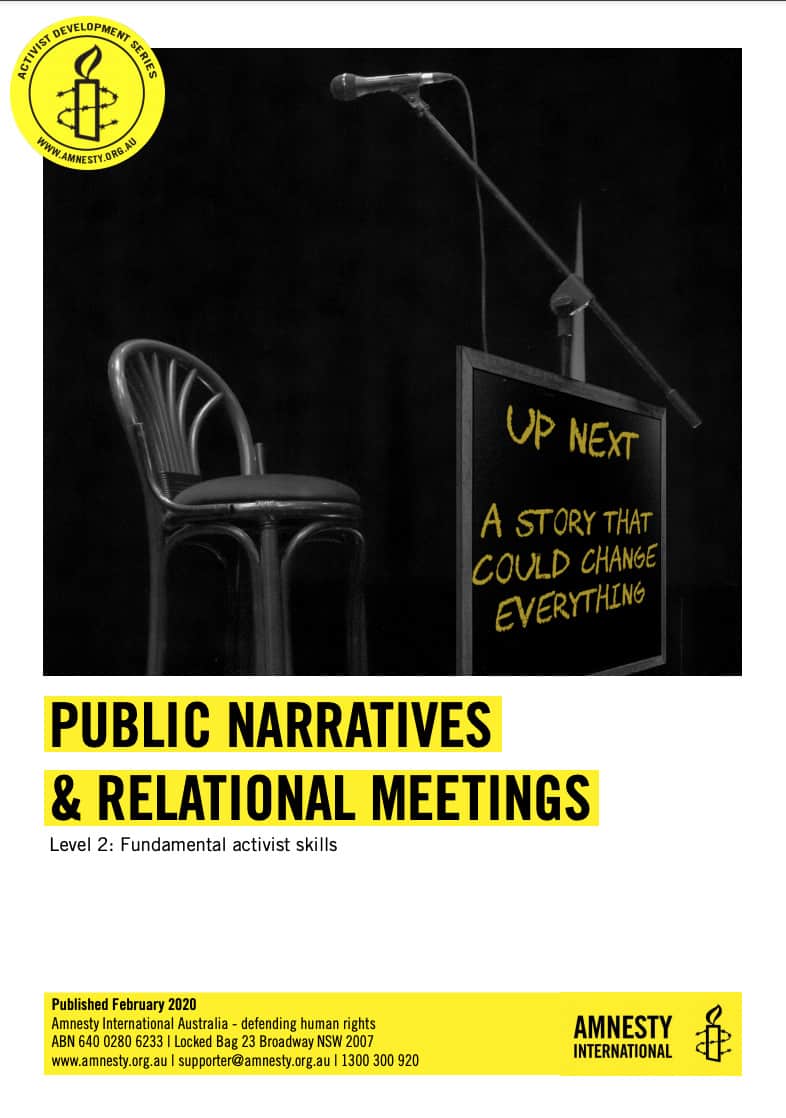
Public Narratives and Relational Meetings – Amnesty International Activist Development Series Level 2: Fundamental activist skills
Build your organizing skills by deepening relationships with this module from Amnesty International Australia.
“Organising is about building deeper relationships with others. We do this for a variety of reasons. It’s so we can increase the number of activists in our movement. So we can pool together our skills and resources, to increase our capacity for activism. It’s so we have more people coordinating and supporting higher level activities. So we have what we need to achieve our goals, to achieve change for human rights. To have more leaders who can help us to distribute power, so we aren’t spread too thin. In this module we’ll look at some organising skills you can use to deepen those relationships. We will look at how you can use personal storytelling to inspire and seek commitment from people. Also so they can better connect with our movement and what we are trying to achieve. We’ll also examine how to make one on one meetings more meaningful. How they can lead to deeper engagement and a stronger relationship with the movement.” – p.3
Contents
1. Introduction
2. Why is it important to build connections with other activists?
3. Public narrative – Story of self, us and now
4. Relational meetings
5. What’s next?
Introduction
“Welcome to our module on public narratives & relational meetings. In our Introduction to Activism at Amnesty International we wrote that activism is about organising and mobilising. That we need to do both to have a successful activism strategy. In this module we’re going to go more in depth about some skills specific to be a more successful organiser.
Organising is about building deeper relationships with others. We do this for a variety of reasons. It’s so we can increase the number of activists in our movement. So we can pool together our skills and resources, to increase our capacity for activism. It’s so we have more people coordinating and supporting higher level activities. So we have what we need to achieve our goals, to achieve change for human rights. To have more leaders who can help us to distribute power, so we aren’t spread too thin. In this module we’ll look at some organising skills you can use to deepen those relationships. We will look at how you can use personal storytelling to inspire and seek commitment from people. Also so they can better connect with our movement and what we are trying to achieve. We’ll also examine how to make one on one meetings more meaningful. How they can lead to deeper engagement and a stronger relationship with the movement.
Why is it important to build connections with other activists?
What connects each and every one of us in the movement is our desire to see change in the world. We have to build a network of committed people to increase our impact. People we know will turn up and take action. We can’t rely on their passion for human rights alone; we need to build commitment to one another and to the cause by identifying shared values. By building connections and developing commitment your goals become intertwined.
The deeper our involvement becomes as activists, the more vital it is that we work with others. This is not work we can do alone or should do in isolation. It’s not only the benefit of being able to better distribute the work. There is also our need for a support network to be there with you in solidarity during stressful times. People you can turn to who remind you why you do this work. Who can give you strength when you most need it. To know that you are never alone and that together you can bring about change.” pgs 2-3

